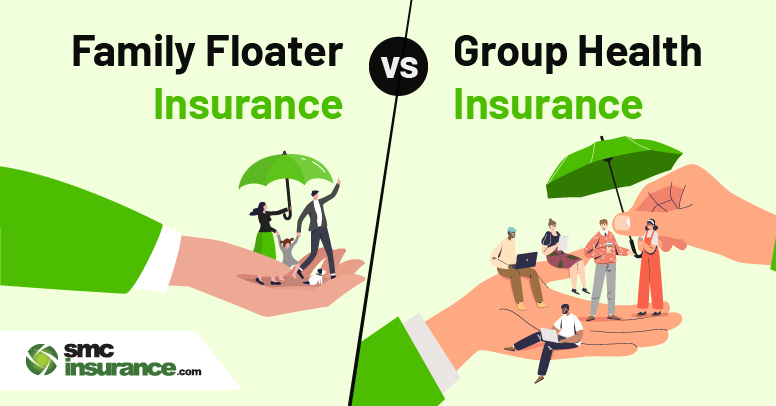When it comes to health insurance policies for a group, there are two predominant policies available in the market. While group health insurance policies typically cover a group of people who are not related to each other, family floater policies offer financial coverage to your family members. Both health insurance policies ensure financial security for their members in cases of unexpected medical emergencies.
The right health insurance policy helps safeguard yourself and your family and lessen the risk of financial instability. As each policy has its own benefits, one might get baffled in picking the right policy for themselves. This article aims at clearing such confusion on which policy is a better pick and has more benefits.
Let us get to know these policies better!
What is a Family Floater policy? How does it work?
Family floater insurance is a type of health insurance coverage in which a single policy can cover your entire family. You can include your family members in the policy, and the cover amount is shared by them.
If any member requires expensive medical treatment, the entire cover amount can be used by them. It is beneficial as the whole family is less likely to get sick in the very same year.
For Example
Sundar has a three-member family and he buys family floater insurance with a coverage amount of Rs. 30 lakhs. In a year, if one of his family members requires a major surgery worth Rs. 20 lakhs, the policy will give the member the required coverage. The unused amount of Rs. 10 lakhs will be available for the rest of the year. In the same policy year, if other family members require treatments worth Rs. 4 lakhs, the family floater policy will cover that too.
What is Group Health insurance? How does it work?
A Group Health Insurance policy offers coverage to the members of a group. The group must have a common affinity, and the coverage only applies to its members. Group health insurance is usually offered to -
- The employees of an organisation
- Members of a club
- Account holders of a bank
- Residents of a society, etc.
The master policyholder or the group administrator (the employer, bank, etc.) pays the premium to the insurer and offers coverage to the group members who get a Certificate of Insurance in their names. Group health insurance policies do not generally require medical tests.
For Example
Sampath is 58 years old and is a diabetic patient. He has an account in XYZ bank, and it has come up with the option of a group insurance policy for all its account holders. In most cases, Sampath would have been denied an insurance policy or expected to pay higher premiums because of his age and health conditions. However, he can seamlessly get health insurance coverage under a group health insurance policy.
Let us now compare both these policies to have a clearer understanding.
Family Floater vs. Group Health Insurance
| |
Family Floater |
Group Health Insurance |
| Who is covered? |
You can add your immediate family members, like your spouse, children, and parents to the policy. Some insurers also allow the addition of other family members like siblings, uncles, aunts, and in-laws. |
All members of the group with the same affinity are covered under the policy. They can be members of society, employees of an organisation, account holders of a bank, and even their dependents. |
| Who pays the premium? |
The policyholder who buys the policy for their family members pays the premiums. |
The premiums are paid by the master policyholder. In cases where any member has opted for additional coverage, a nominal amount may have to be paid by the member himself. |
| Coverage |
The coverage will continue until you keep the policy active by paying premiums regularly. |
The insurance coverage is directly attributed to your membership in the group. If you are no longer a part of the group, your policy ceases. |
| Proposal forms, and declarations |
The documentation process is more detailed in a family floater policy. The proposal form is expected to be filled duly by you with all relevant information. |
The documentation process is very minimal in a group health insurance policy. Such policies are issued based on your consent and declaration of good health. |
| Control over the policy |
As the policyholder, you get complete access, and control over the policy bought. You can add riders, features, and benefits to your preference. |
As the policy is negotiated between the master policyholder and the insurer, you have limited or no control over the policy. |
| Discontinuance of policy |
As you have complete control over the policy, it is your decision to discontinue or terminate it. |
The master policyholder can cancel or withdraw the policy anytime as they negotiate with the insurance provider. |
| Tax implications |
Under Section 80D of the Income Tax Act of 1961, the policyholders are entitled to avail of tax benefits on their annual premiums paid. |
No tax benefits are applicable unless the full or partial premiums are paid by the members themselves. |
To conclude
So, this was all about group health insurance and family floaters. We hope this article helped you understand the nuances of both plans - and that you’ll now be able to choose the best type for yourself.




